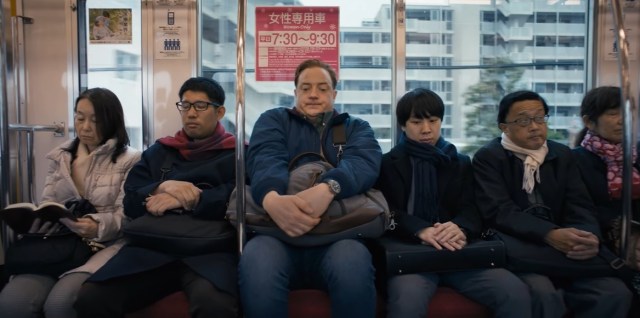
Rental families are thing in Japan, but is Rental Family going to show what life in Japan is really like?
In the decade-plus that SoraNews24 has been around, we’ve never once mentioned Brendan Fraser. This isn’t because of any long-standing beef between us, but simply a result of the Academy Award-winning actor not having any major connections to Japan-related happenings during that interval.
So to all our loyal readers who also happen to be fans of Mr. Fraser, we apologize for the wait, which is now over thanks to the release of the trailer for Rental Family.
An upcoming release from Los Angeles-based Searchlight Pictures, Rental Family stars Fraser as a foreigner living in Japan, eking out a living acting in commercials. When that line of income starts to dry up, he finds a job with a “rental family” agency, where customers pay to have someone play the role of a family member or friend.

This isn’t such a far-fetched premise. There’s an entire ecosystem within the Japanese show business industry of foreign resident actors who specialize in bit roles in commercials, movies, TV dramas, and historical reenactment programs that need non-Japanese on-screen cast members (the live-action adaptation of manga Thermae Romae, for example. has a scene set in an ancient Roman bathhouse with dozens of non-Japanese extras). The size of these parts, though, means that the actors aren’t making A-lister money, so Fraser’s character needing to take on an unorthodox job to make ends meet is pretty plausible.
Likewise, Japan, really does have rental family agencies. They first started attracting significant attention in the early 2010s, and we’ve even tried their services out for ourselves, such as when our reporters rented a middle-aged man or sister (two sisters, actually).
That said, judging from the trailer, it’s debatable whether Rental Family, directed by professionally mononymous Hikari, who was born in Japan and moved to the U.S. after high school, is attempting to accurately depict the status of rental family agencies in contemporary Japanese society, or whether its main goal is to tell a dramatic and emotional story with Fraser’s character’s job as its framing device.
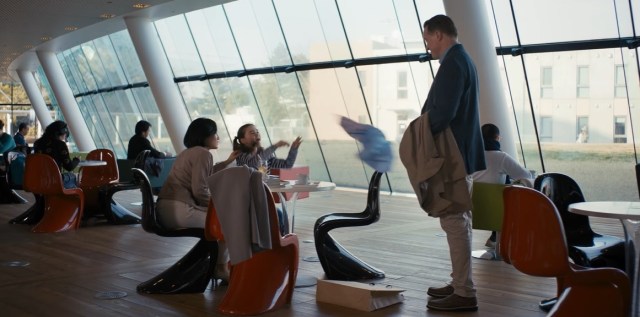
For example. a major plotline seems to involve a Japanese woman hiring Fraser’s character to pretend to be the father of her daughter, who appears to be of mixed Japanese/Caucasian ancestry. “This girl needs a father,” Fraser’s boss tells him, and when he introduces himself to the child as such, in a public place, she shouts “I hate you!” and storms off. “She hates me,” Fraser laments to his boss, who replies “That’s what being a parent is.”
Now, it’s definitely true that most countries don’t have rental family services, and the obvious reason is that the concept would be seen as just too weird. But while the idea isn’t too weird for Japanese society as a whole, renting a family member is still considered unusual by most Japanese people. There’s no real pushback against it, since it’s seen as quirky but harmless fun for those who’re intrigued by the proposition, and you could argue Japan is already somewhat softened regarding paid quasi-social relationships, what with hostess/host bars having been a thing for so long.
However, hiring a stranger to pretend to be your child’s father, especially as an attempt to address clearly severe psychological issues stemming from the parent’s absence, is something that most Japanese people would say is a cruel disservice to the child, and not the sort of benefit that rental family agencies promote themselves as providing. Yes, you can rent a “dad” in Japan, as Conan O’Brien famously did during his time in the country, but again, the service is targeted at adults wanting a fatherly figure for roleplay, not as a way to address the emotional trauma of a minor. Similarly, Japan’s “rental grandma” service is more about the sage wisdom, traditional skills, and calming presence that a woman of advanced age can provide, not necessarily acting as a substitute for an actual familial connection.
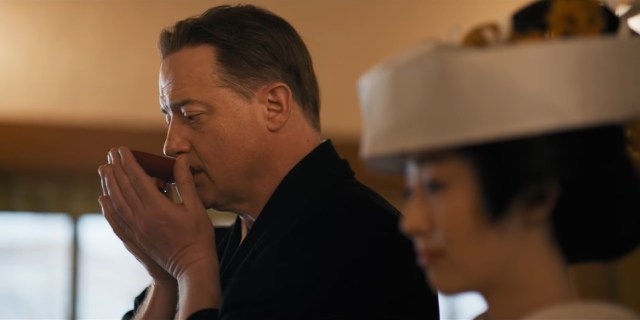
So what about the two scenes where Fraser appears to have been hired to play the role of a groom at a wedding, one a Western-style ceremony and one a traditional Japanese one? Surely that’s got to be crossing some sort of marriage-fraud line, right? Except, no, those are actually possible scenarios, though maybe not the most plausible. That’s because in Japan, wedding ceremonies, whether performed at a church or temple, aren’t legally binding. The only way to make your marriage official in the eyes of the law is to submit your marriage registration paperwork to your local city hall or ward office. So as long as the chappal or temple is OK with it, you could, in theory, hold a wedding ceremony, and a reception too, as a purely for-fun thing, perhaps if circumstances mean you’re unlikely to ever get legally married to an actual life partner. Sure, it’d involve considerable expense, and there’s no guarantee that all of your friends and family members would be onboard and happy to attend, but there’s no legal barrier to doing it if you want to have the wedding experience without actually getting married.
Oh, and you also have to give Rental Family credit for making sure to pick a suitably niche console to be the system of choice of the lonely man who hires Fraser to pretend to be his buddy.
▼ Your true friends are the ones who’ll still hang out and play Dreamcast games with you in 2025 (but they’d be even better friends if they helped keep any snacks off of the disc drive cover).
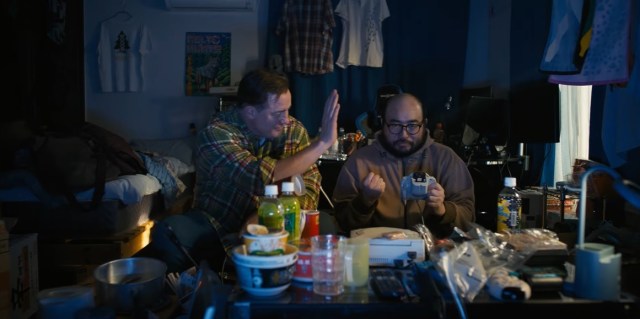
The trailer also includes a few shots of the Shibuya Scramble intersection, but I’m pretty sure the U.N. recently passed a resolution mandating the landmark be shown at least once in any foreign-produced movie with scenes set in Tokyo. The more aggravating thing is when the preview has someone saying, ostensibly to Fraser, “You could live in this country for a hundred years, and there will still be things you won’t understand.” Yeah, Japanese culture has its initially confusing quirks, just like any country’s culture does, but playing up the inscrutability of the Japanese psyche is a pretty tired cliche, especially considering how many of Japan’s real-world foreign residents effectively adapt to the local social norms way before they hit the century mark of living here, and even more especially when the line is paired with visuals showing people waiting at a train crossing which doesn’t exactly make one say “Ah, Japan…so mysterious!”
▼ Granted, the barriers do tend to go down earlier in Japan than in some other countries, but “Wait here so you don’t get hit by a train” isn’t so hard for non-Japanese people to wrap their heads around.
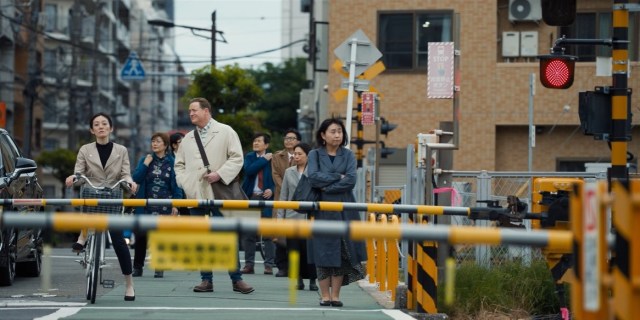
So you could say that it’s kind of a mixed bag in terms of how much of a window into modern Japanese life Rental Family is going to be, but that might not really be its intention anyway. Fraser’s character himself even says “You know sometimes it’s OK to pretend” as the trailer wraps up, so 100-percent real-world accuracy probably isn’t the goal, and if nothing else it looks like it’s going to be a story that’s both introspective and encouraging of empathy, neither of which are bad emotional spaces for a movie to take its audience.
Rental Family opens in theaters in North America on November 21.
Source, images: YouTube/SearchlightPictures
● Want to hear about SoraNews24’s latest articles as soon as they’re published? Follow us on Facebook and Twitter!






